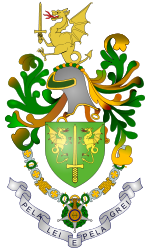Guarda Nacional Republicana
The Guarda Nacional Republicana ( GNR ; German " Republican National Guard " ) is the Portuguese security police and officially part of the Portuguese armed forces . It serves to maintain public safety and order as well as the protection of private and public property throughout the Portuguese territory. It is organized on a paramilitary basis (comparable to the gendarmeries and national guards of other countries) and - on the continental territory of Portugal - is mainly deployed in rural areas.
Only the customs brigade of the GNR operates on the Portuguese islands ( Azores and Madeira ). Otherwise the Polícia de Segurança Pública (PSP) is almost exclusively responsible there, just as in the Portuguese cities .
One of the tasks of the GNR is the protection of buildings and the honor guard at official state events. Troops are represented at the Presidential Palace ( Palácio de Belém ), the Parliament ( Palácio de São Bento ) and the Ministry of Foreign Affairs ( Palácio das Necessidades ).
organization
In peacetime, the GNR reports to the responsible police minister (now Minister of the Interior, Ministro da Administração Interna ) in the areas of recruitment, administration and the exercise of police activities . For armament, uniforms etc. Ä. it is subordinate to the responsible Minister of Defense (today Minister of Defense, Ministro da Defesa Nacional ). In times of war the troops are under the direction of the military command.
Basically, GNR is divided into five "units":
- 1) Comando-Geral ("General Command") based in Lisbon
- 2) Unidades Territoriais ("Territorial Units") with Brigades No. 2 (seat in Lisbon, responsible for Lisboa e Vale do Tejo ), No. 3 (seat in Évora , responsible for Alentejo and Algarve ), No. 4 (seat in Porto , responsible for northern Portugal ) and No. 5 (based in Coimbra , responsible for central Portugal ))
- 3) Unidades de Reserva (" Reserve Units "), comprising the garrison companies, the Operations Battalion and the GIPS rapid protection and security force
- 4) Unidades Especiais ("Special Forces"), includes the Customs Brigade ( Brigada Fiscal ) and the Transport Brigade ( Brigada de Trânsito )
- 5) Outras unidades ("Other Units"), comprises the police school of the GNR based in Queluz as well as Aveiro and Portalegre , the GNR music band (in Lisbon) and the nature and environmental protection service SEPNA based in Lisbon
history
The Guarda Nacional Republicana is the direct successor of the Guarda Real da Polícia ("Royal Police Station"), which had its origins in the early 19th century.
First, King João V of Portugal founded the Guarda Real da Polícia de Lisboa (GRP; "Royal Police Station of Lisbon") in 1801 under the direction of the Intendente-Geral of the Court and Imperial Police, Pina Manique . The French gendarmerie , which was founded ten years earlier, in 1791, is said to have served as a model . As a result of the founding of the GRP, João also set up branches in Porto and Rio de Janeiro - at that time Brazil was still part of Portugal. The Brazilian GRP is the forerunner of today's Polícia Militar .
At the end of May 1843 - as a consequence of the Miguelistenkrieg - King Pedro IV dissolved the Guarda Real and created two police stations with the names Guarda Municipal de Lisboa ("Municipal Guard of Lisbon") and Guarda Municipal do Porto ("Municipal Guard of Porto") . In their function, the guards resembled their predecessors. In 1868, both guards were given a joint general command, based in the Carmo barracks ( Quartel do Carmo ) in Lisbon, which is still the headquarters of the GNR today. The Guarda Municipal was then part of the Portuguese armed forces , but was dependent on the Royal Ministry ( Ministério do Reino ).
After the abdication of King Manuel II and the subsequent dissolution of the monarchy , the name of the Guarda Municipal was changed to Guarda Republicana ("Republican Guard"). A year later, on May 3, 1911, it was renamed again, since then it is still called Guarda Nacional Republicana ("Republican National Guard"). The basic features of the GNR have been preserved from 1911 until today. Since 1993 the former customs guard, the Guarda Fiscal , under the name of the customs brigade, Brigada Fiscal , also belongs to the GNR.
Web links
- Official website of the Guarda Nacional Republicana (Portuguese)


